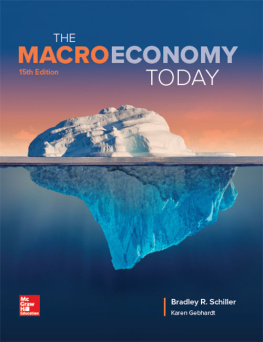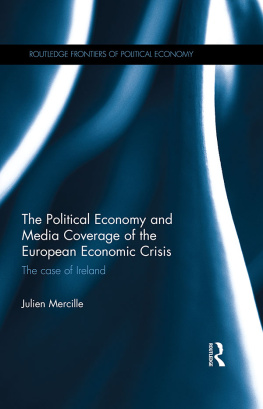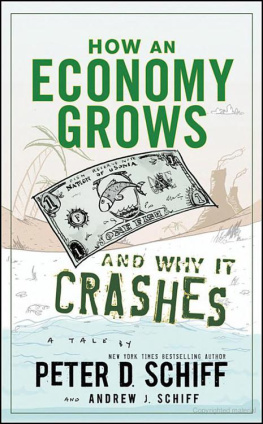Table of Contents
- Dedication
- Title Page
- Copyright Page
- Acknowledgements
- Introduction
- The economy and economic life
- Communication, media and economic life
- Value plurality in economic life
- Structure of the book
- Notes
- Part I: Economic action is communicative
- 1. Does homo economicus talk? Communication in economic theory
- Economic action is a form of communication
- Communication is information plus signalling
- Communication is the strategic use of information: game theory
- Recent developments: a new role for communication?
- Conclusion
- Notes
- 2. The symbolism of money, payment and price
- Moneys symbolic qualities
- Psychoanalysis and money symbolism
- The symbolic function of payments
- The meaning of price
- Changing meanings of money, payment and price
- Conclusion
- Notes
- Part II: Communication constructs economic life
- 3. Promotion
- The rhetoric of the economic system
- The world of work: promotion and self-promotion
- Consumption and delinguistified communication
- Conclusion
- Notes
- 4. Information
- New volumes of information
- New forms of exchange and new economic models
- Software, algorithms and proprietary data
- Marketing discrimination
- Price personalization
- Conclusion
- 5. Narrative
- Narratives, stories and why they matter
- Literary fiction and the repudiation of the market
- Filmic and televisual narratives about money
- The fact/fiction continuum in economic writing
- The economy as a narrated phenomenon
- The challenge to narrative
- Conclusion
- Notes
- 6. Discussion
- Mediated discussion about economic life
- Audience discussion shows
- Online discussion
- Everyday discussion of economic issues
- Conclusion
- Notes
- Conclusion
- Reframing communication in economic life
- What should economic communication be like?
- Notes
- References
- Index
- End User License Agreement
Guide
- Table of Contents
- Begin Reading
Dedication
For Max and Ezra
Communication and Economic Life
LIZ MOOR
polity
Copyright Page
Copyright Liz Moor 2022
The right of Liz Moor to be identified as Author of this Work has been asserted in accordance with the UK Copyright, Designs and Patents Act 1988.
First published in 2022 by Polity Press
Polity Press
65 Bridge Street
Cambridge CB2 1UR, UK
Polity Press
101 Station Landing
Suite 300
Medford, MA 02155, USA
All rights reserved. Except for the quotation of short passages for the purpose of criticism and review, no part of this publication may be reproduced, stored in a retrieval system or transmitted, in any form or by any means, electronic, mechanical, photocopying, recording or otherwise, without the prior permission of the publisher.
ISBN-13: 978-0-7456-8701-8
ISBN-13: 978-0-7456-8702-5(pb)
A catalogue record for this book is available from the British Library.
Library of Congress Control Number: 2021939063
by Fakenham Prepress Solutions, Fakenham, Norfolk NR21 8NL
The publisher has used its best endeavours to ensure that the URLs for external websites referred to in this book are correct and active at the time of going to press. However, the publisher has no responsibility for the websites and can make no guarantee that a site will remain live or that the content is or will remain appropriate.
Every effort has been made to trace all copyright holders, but if any have been overlooked the publisher will be pleased to include any necessary credits in any subsequent reprint or edition.
For further information on Polity, visit our website: politybooks.com
Acknowledgements
Many people have helped me to complete this book. Three reviewers of the original proposal made helpful suggestions, while Nick Couldry, Jo Littler and Don Slater offered early encouragement. Parts of were presented to the Geography department at the University of Nottingham and I greatly appreciated their attentive reading and thoughtful comments. Some ideas were also tested at a MeCCSA panel organized by Rebecca Bramall, who has been kind and supportive throughout. At Polity, Stephanie Homer, Ellen MacDonald-Kramer and Mary Savigar have all been endlessly patient and accommodating, for which I am very grateful.
Friends and colleagues who read parts of the text include Clea Bourne, Beckie Coleman, David Moats and Dave OBrien. I would like to thank them for their frank and constructive feedback. The remaining errors and omissions are my own.
Some parts of have previously been published in Consumption, Markets and Culture and in the Journal of Cultural Economy. I am grateful to Jonathan Schroeder for encouraging me to put my thoughts about money symbolism down on paper at a relatively early stage, and to Liz McFall for ongoing enthusiasm and kindness. Liz has been central to many peoples experience of intellectual community in recent years, at a time when it has been especially important. My thinking about price (and much else) has been enriched through conversations with Celia Lury. Lana Swartz provided encouragement and inspiration from across the Atlantic.
Colleagues at Goldsmiths supported me with a one-term sabbatical. I am particularly grateful to Clea Bourne, Natalie Fenton, Gholam Khiabany, Rachel Moore, Anamik Saha, Gareth Stanton and Milly Williamson for encouragement, gifts of books and cakes, teaching and administrative cover, and general good vibes. I would also like to thank Jenny Carpenter, Sam Friedman, Meghan Horvath, Shireen Kanji, Kate Maclean, Rebecca Strong and Emma Uprichard. Chris Arning made trips to the British Library more companionable. Max and Ezra are the best possible people to come home to. Special thanks to Sarah Bloomfield for the expert childcare that made finishing the book possible.
Introduction
At the end of 2016, Anand Menon, an expert on European politics, reflected on what he had learned from a year spent travelling around the UK to discuss the referendum on leaving the European Union. During a trip to the northeast of England he had told a town hall-style meeting that the vast majority of economists agreed that exiting the EU would lead to a substantial economic slowdown, and a two per cent drop in gross domestic product (or GDP), the usual measure of an economys health. Responding to him, a member of the audience had shouted, Thats your bloody GDP. Not ours!. On another excursion, he had met a woman in Yorkshire who told him that she didnt mind taking the economic hit associated with Brexit, but that it would be nice to see the rich folk down south suffer (Menon 2016a). Reflecting on these events, Menon thought that they showed a distrust of elites and experts, but also a distrust of aggregate data and statistics. Perhaps it was all very well to show that on average membership of the EU had increased GDP, or that on average migration to the UK had been positive for the economy, but if these averages did not tally with peoples own experience, then it was unsurprising that the figures might not seem to belong to them (Menon 2016b). As one commentator observed, maybe Menons heckler was right that the UK economy had become so unequal that it can no longer be talked about as one unitary economy (Chakrabortty 2017).






